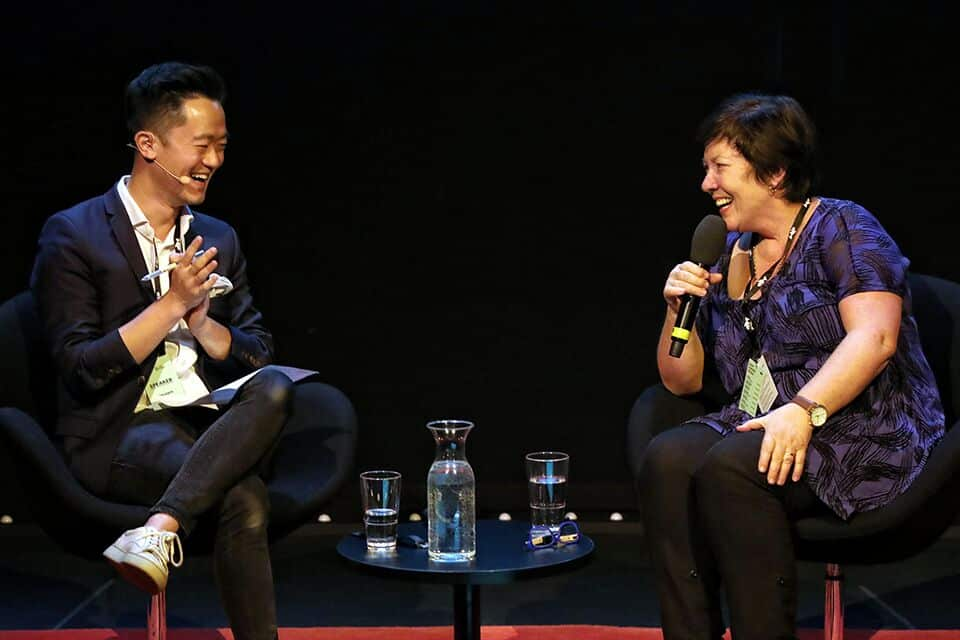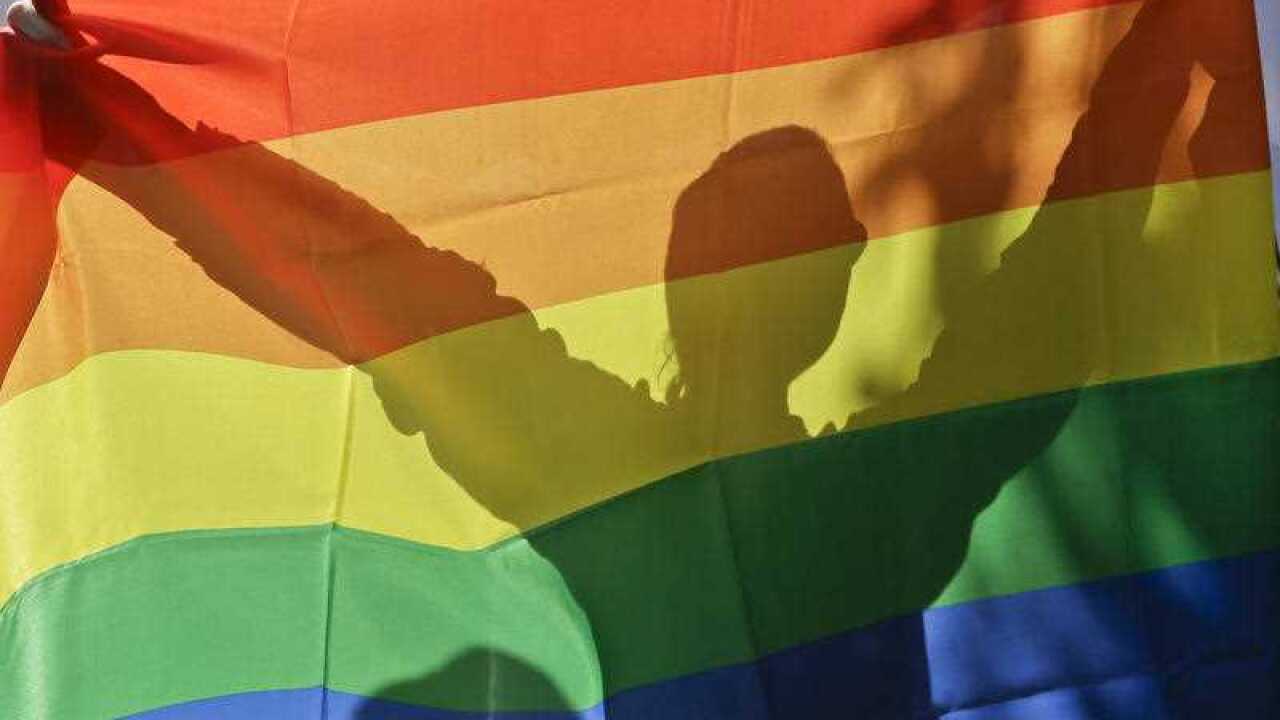Most will recognise her as one the hosts of popular 90s show Good News Week, but Julie McCrossin's legacy also lays heavily in the activism which contributed to the Australian LGBTQIA+ community gaining essential rights.
McCrossin is one of the 78ers, and has long been a fierce activist involved in women's liberation, prison reform, land rights, and particularly the Gay Liberation movement of the 70s.
I sat down with Julie to chat about her appearance at Sydney's Antidote festival, where she discussed the events of the brutally violent 1978 Mardi Gras march, and the evolution of queer activism.

Benjamin Law and Julie McCrossin speaking as a part of the 2017 Antidote festival at the Sydney Opera House. Source: Prudence Upton, supplied by Antidote.
Whatever you do, do something positive - you help yourself by helping others.
The revered broadcaster, who laughingly refers to herself as "the friendly surburban face of Australian lesbianism", became a part of the Gay Liberation movement at university in 1972. She tells me that when she first started attending meetings, she was the only woman in a room filled with homosexual men.
She explains that she, along with hundreds of others, were simply 'fed up' with the way gay men and women were being treated by wider society.
The queer zeitgeist
I ask Julie what it was that made her engage with activism and the Gay Liberation movement at university, and what she believes was catalyst that caused so many people to rise up and fight in the late 1970s.
"I've been reflecting, actually - why did I do that?!" she exclaims. "But I think I just had an extraordinary burden of pain and shame, and I was fed up with that. I didn't feel evil, I didn't feel bad, I didn't feel mad. I just somehow sensed there was something terribly wrong with the way society was treating us. To be honest with you, I still feel bewildered that so many of us managed to find that courage.
"[At Antidote], I talked about what it was in the zeitgeist that made so many people in the '70s willing to risk everything - a criminal record, being rejected by the family, losing their job. Literally hundreds and hundreds of people in Sydney, across Australia, and in other parts of the world, suddenly stood up and said 'No, we're not going to accept it anymore', even though it was a deeply shameful thing."
McCrossin is fascinated by the zeitgeist then and now surrounding LGBTQIA rights, telling me that she did a talk about same-sex marriage in 1999, and "it fell like a stone - nobody was interested!".
"What feeds that zeitgeist, the spirit of that age? I reflected on now, about marriage equality - again, the zeitgeist suddenly seems to be that a huge proportion of the population are saying 'Yeah, why shouldn't two women or two men marry?'. How amazing! What a change of attitude."
Getting married
McCrossin recalls getting "New York married" to her partner of 22 years, Melissa Gibson. She explains that they had always assumed they would wait until it was legalised here - until she received a diagnosis of Stage 4 Head and Neck cancer in 2013, and began chemotherapy.
The couple, along with Melissa's children Amelia and Luke, flew to Manhattan to tie the knot the following year, in a ceremony she says "meant a lot" to her and Gibson. After they returned to Australia, they had a blessing at the South Sydney Uniting Church, where McCrossin is a church elder.
Nearly four years on, and almost forty years since she attended the events of the first Mardi Gras, McCrossin's marriage is still unable to be recognised in Australia.
At her talk at the Antidote festival, McCrossin puts it this way: "So much progress has been made [in her years of activism]. But not nearly as much as I hoped."
"Polite" activism vs. the violent protests of the '70s
After listening to McCrossin describe her experience as a passionate activist who took to the streets and made many of her activist friends in jail cells, I'm curious about the evolution of LGBTQI+ activism between the 1970s and now. I explain to Julie that as a part of the current debate around same-sex marriage, it often feels as though young people are expected to act as PR people for the queer community - they mustn't be aggressive, they must always be polite and respectfully explain themselves to those who want to deny them the ability to marry the person they love.
I ask her if she believes young people should loudly take to the streets like people of her own generation did, or whether they should try to adhere to the concept of 'polite activism'?
"People should protest and advocate in the way they wish, I'm not seeking to control another's behaviour," she responds. "I was an incredibly wild girl when I was young... So I'm open-minded, I think it's up to people to decide the way they wish to do it. But I'll speak to why I am choosing the manner that I've described, which is to engage respectfully, with persistent, coherent, intellectual argument, and personal expression.
"What I'd say is, the '70s, and the late 2010s - what do we call it?! [laughs] - it's chalk and cheese, they're totally different times.
"I was driving up the street, and put up by Sydney City Council, [there was] a great big rainbow banner with 'VOTE YES' on it. A High Court judge - more than one - is openly gay. Jennifer Westacott is the head of the Business Council of Australia, and she sits on major company boards, and she's openly gay. Mr [Alan] Joyce from Qantas is openly gay, and putting funds into the 'Yes' campaign. Dr Kerryn Phelps was head of the Australian Medical Association (AMA) and openly gay. People are in major institutions, major professions. Penny Wong [is] a member of Cabinet, with a partner and a baby, made in their own special way. This is astonishing social change.
"I think, strategically, violent demonstrations would be inappropriate. Not the least of which, because in our day, violence was predominantly - but I'm going to be honest with you, not exclusively - initiated by the police. There was a hostility. I showed some images at Antidote, one on Taylor Square, where we were going to a demonstration, and there was always a line of police. We were almost like, what's that movie with the gangs in New York? West Side Story - it was our gang against their gang. Whereas now, police have gay and lesbian liaison officers, police officers are openly gay. I've MC'd for the Australia Federal Police award night for their liaison officers, where the keynote speaker was Justice Kirby, and the entertainment was a drag queen from a local refuge supported by the police."
"It's a different era. Different tactics for different times."
Educating queer youth
Speaking candidly, I tell Julie that LGBTQIA+ people of my own generation have never known life without the Mardi Gras being a major, nationally-televised party, and may not be aware of what happened in 1978, or what previous generations went through in order to secure certain rights.
I ask if she believes it should be essential for LGBTQIA+ youth to educate themselves on queer history?
"Again, I don't like to be didactic and demanding... I don't think as '78ers we should be put up on some pedestal. We were an irreverent group of people, and many of us had a whacko good time fighting for it!"
McCrossin pauses to clarify: "I don't want to diminish people who were bashed and that sort of thing. I had an experience in Darlinghurst Police Station once, of an officer putting me through a doorway without opening the door, you know what I'm saying? They were violent times, and I'm not saying that was fun, but I don't think people should be reverential."
"Informing themselves will really help them understand what either they themselves, or the person they love is facing. It will give both hope and context to their lives. [...] As a gay woman, I'm grateful when someone takes the effort to inform themselves."
"I would encourage people to inform themselves of some of this history, because it's still happening. My impression is, about 95 per cent plus of people, whether they're transgender, bisexual, gay, or lesbian, to talk to their mother or father is still a big deal. It's a very rare parent who goes 'oh, fine!'. It's a very rare parent who doesn't have a little weep, and worries about grandchildren, and worries about 'did I do something wrong in the way I raised you', or just worries - an amorphous anxiety.
"The good news is, there's now a lot of stuff in our community, where parents can inform themselves. I love Parents and Friends for Lesbians and Gays (PFLAG) which is a long-term organisation that helps the parents of lesbian and gay people. It's not too hard now for parents to find positive information - although not in some cultural groups, or faith groups. But in my era, parents had NOTHING. Just as I had nothing, they had nothing. For people to understand why that shame still exists, both within Australia but very significantly oversea - I think the history is important. But I don't want to wag my finger, I'd more like to seduce them into informing themselves."
"Everything will be alright"
Before interviewing Julie, I put out a call on social media, for any young LGBTQI+ people who wanted to ask a question of a 78er. One response I received was from a young queer woman, who was struggling with the ongoing same-sex marriage debate, and was feeling hopeless and emotionally drained. She said, "I want to contribute to change, but I don't know where to begin. What can young people do to fight for their rights in 2017, where do I start?"
Julie responded, "First of all - everything will be alright. There are huge communities of gay, lesbian, bisexual, transgender, queer people, people of all sorts, with all sorts of interests and political views - you WILL find your tribe. You will find a partner, and if you wish to have children, you will have children.
"If you're at school, I would try to do assignments or projects that enable you to inform yourself on different points of view, and also some of the history. Information is power. There have been gay and lesbian and transgender people for millennia, and there is a huge cultural history. You are not alone. Draw on that history.
"There's also a long history of struggle, so join the people who are lighting a candle in the darkness. Wherever you are, whether its school, university or a workplace, do what you can to spread the word that the "rainbow people" are just part of human existence. You might be creating in the arts, you might be a political activist, you might write a novel, you might make a film, you might volunteer in a LGBTQI+ counselling service.
"Whatever you do, do something positive - you help yourself by helping others."


